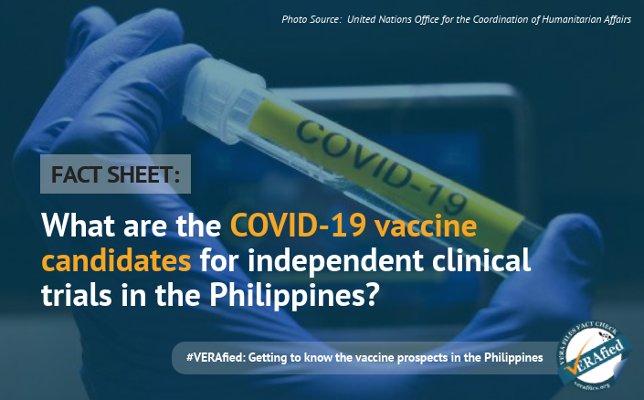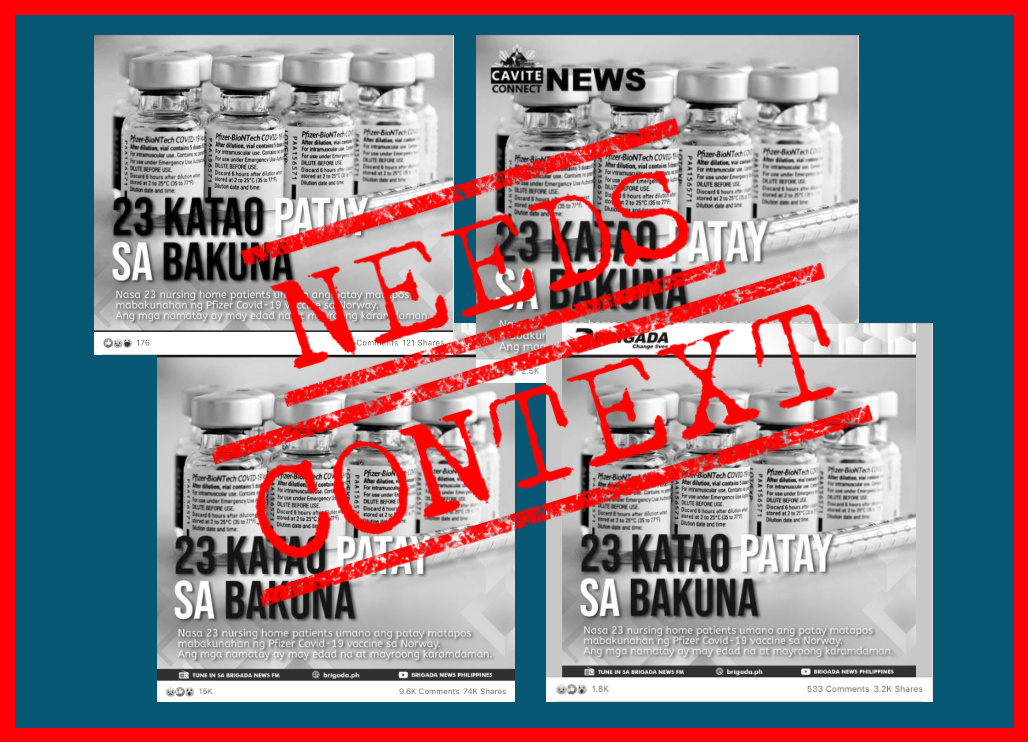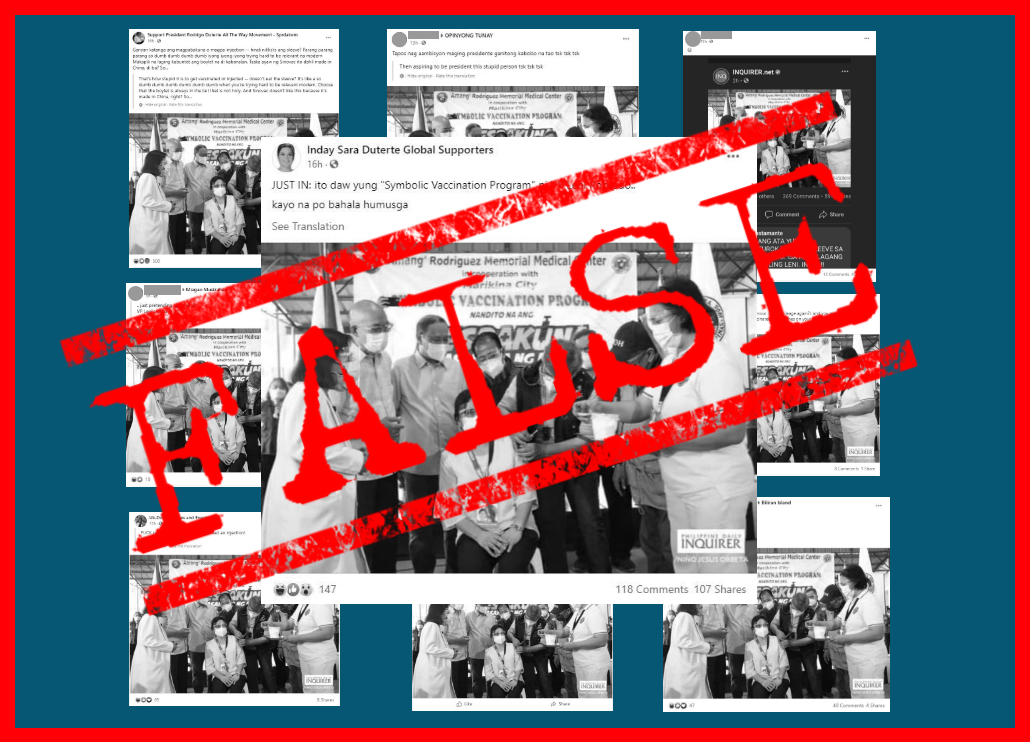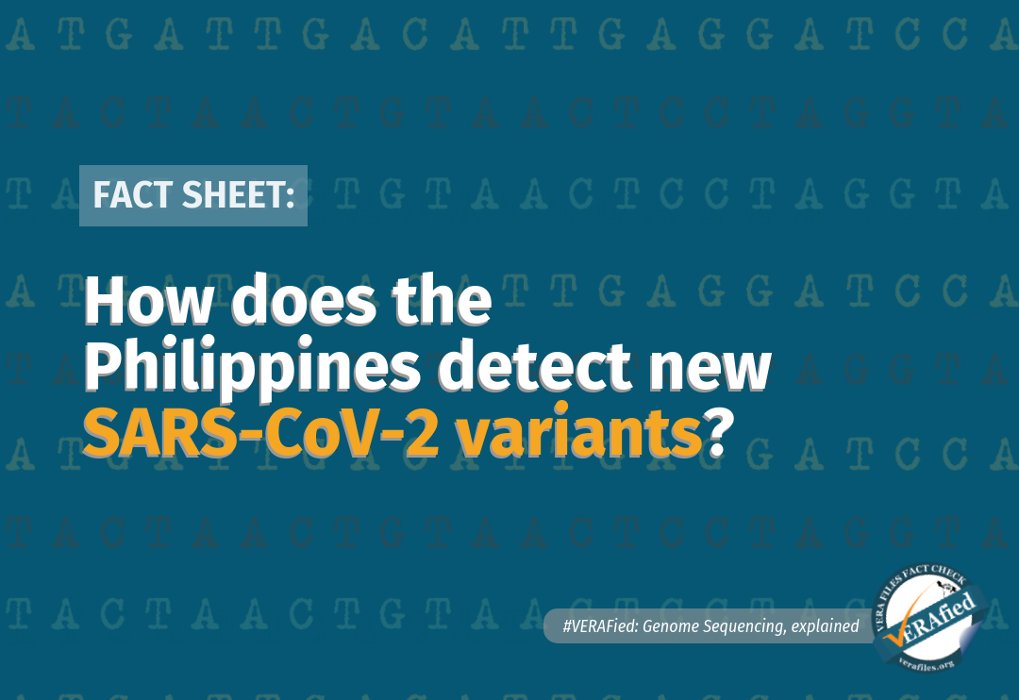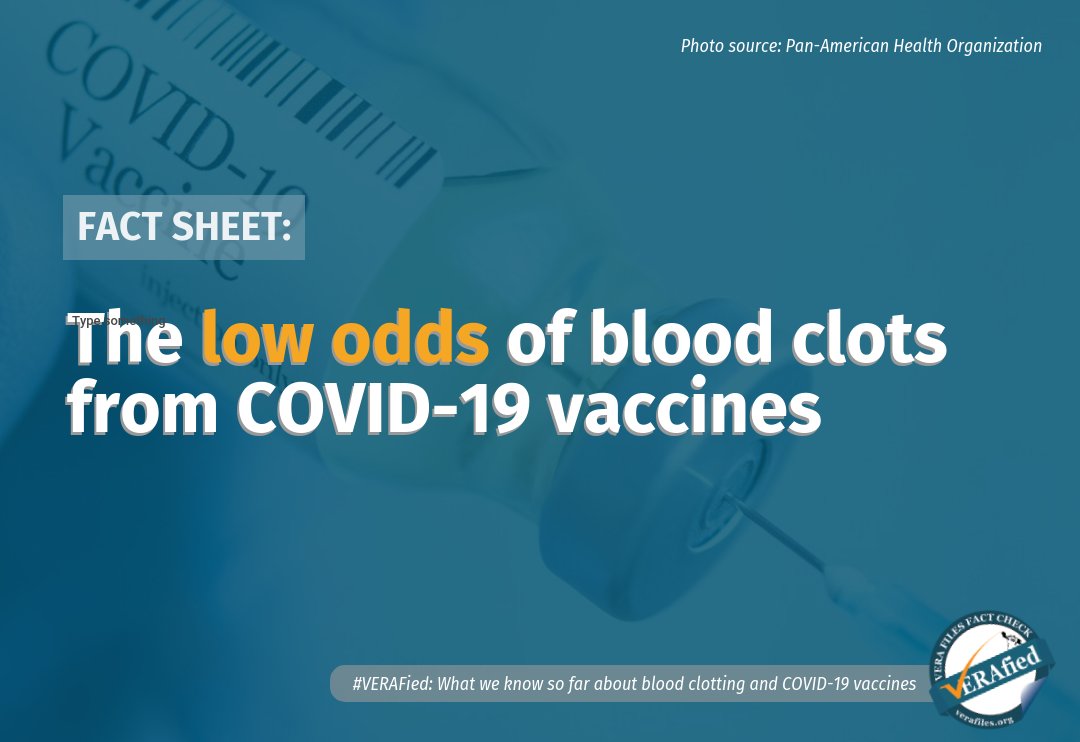Ten months into the coronavirus disease 2019 (COVID-19) pandemic, the race for a safe and effective vaccine continues. Researchers and pharmaceutical developers have studied the sequence of the severe acute respiratory syndrome coronavirus 2 (SARS-CoV-2) and sped up the process of clinical trials to supply rations for over 170 countries, including the Philippines. (See Amid speedy trials, access to safe COVID-19 vaccines is priority: experts)
But in a media interview on Nov. 18, Health Undersecretary Maria Rosario Singh-Vergeire said: “Other than having supply, factors such as logistics and the quality of vaccines also need to be evaluated to determine which vaccine the country would procure.”
Five companies are in various stages of applications for independent clinical trials in the country.
On Oct. 30, Food and Drug Administration (FDA) Director-General Eric Domingo said the Vaccine Experts Panel (VEP) has been reviewing the applications by Australia’s Clover Biopharmaceutical, America’s Janssen Pharmaceuticals, and Russia’s Gamaleya Research Institute.
Clover Biopharmaceutical and China’s Sinovac Biotech have both moved forward to the FDA for regulatory and ethics review as of Nov. 27.
On Nov. 25, Vergeire confirmed the addition of the United Kingdom’s University of Oxford and AstraZeneca to the pool of applicants, saying it is currently completing the requirements for the first stage of applications.
Gamaleya, however, is still completing the required data documentation for its safety and immunogenicity as of Nov. 27, said Jaime Montoya, executive director of the Department of Science and Technology Philippine Health Council for Research and Development (DOST-PCHRD).
“We expect kung dire-diretso na halimbawa ang Sinovac at ang Clover, we foresee na baka magsimula na at the earliest ang clinical trials baka late December or early January,” Montoya told reporters in a media forum.
(If Sinovac and Clover proceed smoothly, we can foresee clinical trials to start probably in late December or early January.)
Carlito Galvez Jr., the vaccine czar and COVID-19 response chief, said the country may get 60 million vaccine doses by the second quarter of 2021. On Nov. 27, AstraZeneca signed a supply deal with the private sector for 2.6 million doses, half of which will be given to the government to inoculate about one million Filipinos. Aside from AstraZeneca, Galvez, in an earlier briefing on Nov. 24, said the country is in talks with Sinovac and Pfizer, although no deals have been made yet.
Of the over 200 vaccines being developed to fight the novel coronavirus, here are the current prospects in the Philippines you need to know:
CoronaVac
Chinese Sinovac BioTech’s CoronaVac is one of two vaccine candidates endorsed by the DOST for FDA’s evaluation as of Nov. 27. Its platform is an inactivated or live-attenuated vaccine; meaning, it uses a weakened version of the coronavirus to induce an immune response. The disease-causing organism is either killed or cultured in the laboratory to the point that it cannot cause a disease.
DOST-PCHRD said in a letter sent to VERA Files on Nov. 24 that this kind of platform requires “extensive safety testing” since there is a “potential for a vaccine-associated enhanced disease.”
Responding to a question about a reported adverse event involving a CoronaVac trial volunteer in Brazil on Nov. 9, Vergeire said the manufacturer is also responsible for informing the Philippine government about any negative outcome so it can be carefully reviewed by the VEP.
Ad26.COV2.S (Other name: JNJ-78436735)
Janssen Pharmaceuticals, owned by U.S.-based Johnson & Johnson, is the main researcher and developer of the viral vector vaccine, using the common-cold causing adenovirus.
In this platform or type of vaccine, the adenovirus that is naturally able to enter human cells carries the DNA or RNA of the pathogen of interest, which is SARS-CoV-2. These vectors are altered so that they can neither produce infectious viruses nor cause disease.
Janssen used the same technology, AdVac, for its Ebola virus vaccine, the first in this platform to get approval from European regulators in July 2020.
AZD1222 (Other name: ChAdOx1)
Like Janssen’s, the platform of AstraZeneca and University of Oxford’s vaccine candidate is a viral vector. It uses “a harmless, weakened adenovirus that usually causes the common cold in chimpanzees,” according to the Oxford COVID-19 vaccine web hub. It has been genetically modified “so that it is impossible for it to grow in humans.”
According to Galvez in the Nov. 24 briefing, AstraZeneca’s vaccine is currently the cheapest at US$5 per dose, or around P240.
On Nov. 23, the company reported an average of 70% efficacy of its vaccine as a result of two different dosing regimens. One subgroup with less volunteers received a half dose and a full dose a month later, and yielded 92% efficacy. In another subgroup with more volunteers, two full doses suggested only a 62% vaccine efficacy.
Sputnik V (Other name: Gam-COVID-Vac)
Sputnik V is the vaccine candidate of Gamaleya National Center of Epidemiology and Microbiology, and sponsored by the Russia Direct Investment Fund. It is also an adenoviral vector vaccine that could not replicate in cells.
President Rodrigo Duterte earlier expressed preference for the Russian vaccine for government-to-government deals. He said in August that he was willing to be a “guinea pig” for the vaccine once it becomes available for human use before even completing its large-scale tests. (See VERA FILES FACT SHEET: The COVID-19 vaccine from Russia, in context)
Russian President Vladimir Putin claims Sputnik V is the first “registered COVID-19 vaccine” after Gamaleya sought emergency use approval in September. But several scientists scrutinized it for not releasing peer-reviewed studies of the first and second phase results of its vaccine candidate before full human use.
SCB-2019
Clover Biopharmaceutical AUS Pty. Ltd. is an Australia-based company with links to China’s Sichuan Clover Biopharmaceuticals. Its vaccine candidate, SCB-2019, is a subunit or protein-based vaccine that uses coronavirus protein fragments to stimulate an immune response. This platform presents an antigen by using only a few parts of the disease-causing organism, usually the parts of its surface.
Protein-based vaccines are considered safer than the inactive vaccines because they are not whole organisms, according to molecular biologist Denise Bascos, whose research interest is immunology. But because proteins cannot trigger an immune response on their own, subunit vaccines may need adjuvants, or molecules that signal damage in the cells. (See VERA FILES FACT SHEET: Five questions on COVID-19 vaccines, answered)
Alum is the most commonly used adjuvant for vaccines. It serves as a “slow release” agent for the antigen and ensures the body has enough time to mount a response to it instead of destroying it right away, Bascos said.
BNT162b2
The platform of Pfizer and German BioNTech’s vaccine candidate is genetic-based technology, particularly the messenger RNA (mRNA). While this vaccine technology has long been a research topic of many scientists, no RNA-based vaccines are “clinically proven” yet through large-scale tests, according to a Sept. 3 article published in the Journal of the American Medical Association.
Pfizer’s BNT162b2 as well as Moderna’s mRNA vaccine could potentially be the first made available in the market, said Bascos, a professor at the University of the Philippines National Institute of Molecular Biology and Biotechnology.
Genetic-based vaccines use one or more of the coronavirus’s own genes. What makes mRNA unique among others is that it is much easier to synthesize in larger quantities and in a shorter period of time. How the design works is upon introduction into the human body, small segments of DNA or RNA are converted into proteins. This then becomes the antigen for the immune response.
DNA vaccines are “incredibly stable,” according to Bascos, so they would not necessarily need to be refrigerated during transport or storage to remain effective. RNA, on the other hand, is less resilient to heat, which is why Moderna’s and Pfizer’s vaccines need to be stored at minus 20 degrees Celsius and minus 75 degrees Celsius, respectively.
What’s next?
The Philippine government is targeting to vaccinate at least 50 to 60% of the country’s population to achieve protection from viral transmission. Herd immunity is the phenomenon in which susceptible individuals are indirectly protected from infection when a sufficient fraction of the population is immune.
However, the World Health Organization (WHO) said the herd immunity threshold for COVID-19 is still uncertain, particularly about how long the immune response will be or how it will vary for different people.
“One very encouraging thing is to see that at least with the two mRNA vaccine results that we’ve heard, Pfizer and Moderna, we seem to be achieving high efficacy,” said WHO’s chief scientist Soumya Swaminathan in a Nov. 16 press briefing.
“But there are many, many questions still remaining about the duration of protection, the impact on severe disease, the impact on different sub-populations, especially the elderly, as well as the adverse events beyond a certain period of time,” she added.
This means that even with the vaccine available, it will take time to achieve complete protection against this disease, Bascos said.
She added: “Eradication can only occur when we have near-complete vaccination for our population for a sustained period of time.”
Sources
AstraZeneca and University of Oxford
- ABS-CBN News, Drug maker AstraZeneca applies for COVID-19 vaccine trials in PH, Nov. 20, 2020
- CNN Philippines, AstraZeneca wants to hold COVID-19 clinical trial in PH, Nov. 20, 2020
- Inquirer.net, AstraZeneca open to conduct COVID-19 vaccine clinical trials in PH, Nov. 20, 2020
- ClinicalTrials.gov, Phase III Double-blind, Placebo-controlled Study of AZD1222 for the Prevention of COVID-19 in Adults – Full Text View, Nov. 13, 2020
- The Lancet, Safety and immunogenicity of ChAdOx1 nCoV-19 vaccine administered in a prime-boost regimen in young and old adults (COV002): a single-blind, randomised, controlled, phase 2/3 trial, Nov. 18, 2020
- AstraZeneca, COVID-19 vaccine AZD1222 is better tolerated in older adults than younger adults with similar immune responses across all age groups, Nov. 19, 2020
- AstraZeneca, AZD1222 vaccine met primary efficacy endpoint in preventing COVID-19, Nov. 23, 2020
Clover Biopharmaceutical, GSK, and Dynavax
- ClinicalTrials.gov, SCB-2019 as COVID-19 Vaccine – Full Text View, June 23, 2020
- Reuters, China’s Clover applies for Philippines COVID-19 vaccine trial, Oct. 30, 2020
- GSK, Media GSK actions to support the global response to COVID-19,
- CNN Philippines, Another Chinese firm undergoes review to hold COVID-19 vaccine clinical trial in PH, Oct. 30, 2020
Gamaleya Research Institute
- The Lancet, The Russian vaccine for COVID-19, Sept. 4, 2020
- CNN Philippines, Russia can produce COVID-19 vaccines for PH as early as January – envoy, Nov. 14, 2020
- South China Morning Post, Russia, China in lead as Philippines seeks deals for Covid-19 vaccines, Nov. 14, 2020
- Sputnik V, The first interim data analysis of the Sputnik V vaccine against COVID-19 phase III clinical, Nov. 11, 2020
- Sputnik V, Second interim analysis of clinical trial data showed a 91.4% efficacy for the Sputnik V vaccine on day 28 after the first dose; vaccine efficacy is over 95% 42 days after the first dose, Nov. 24, 2020
Janssen Pharmaceutical Companies
- medRxiv, Safety and immunogenicity of the Ad26.COV2.S COVID-19 vaccine candidate: interim results of a phase 1/2a, double-blind, randomized, placebo-controlled trial, Sept. 25, 2020
- Johnson & Johnson, (This statement was updated on October 4, 2020 to include additional information) Johnson & Johnson Posts Interim Results from Phase 1/2a Clinical Trial of its Janssen COVID-19 Vaccine Candidate, Oct. 4, 2020
- ClinicalTrials.gov, A Study of Ad26.COV2.S for the Prevention of SARS-CoV-2-Mediated COVID-19 in Adult Participants – Full Text View, Nov. 9, 2020
- Johnson and Johnson, Johnson & Johnson Initiates Second Global Phase 3 Clinical Trial of its Janssen COVID-19 Vaccine Candidate, Nov. 15, 2020
- World Health Organization, ICTRP Search Portal
- Johnson & Johnson, Johnson & Johnson Initiates Second Global Phase 3 Clinical Trial of its Janssen COVID-19 Vaccine Candidate, Nov. 15, 2020
Pfizer and BioNTech
- Pfizer, PFIZER AND BIONTECH ANNOUNCE VACCINE CANDIDATE AGAINST COVID-19 ACHIEVED SUCCESS IN FIRST INTERIM ANALYSIS FROM PHASE 3 STUDY, Nov. 9, 2020
- Pfizer, Pfizer and BioNTech Conclude Phase 3 Study of COVID-19 Vaccine Candidate, Meeting All Primary Efficacy Endpoints, Nov. 18, 2020
- Rappler, Pfizer to ensure supply of COVID-19 vaccine for PH, says envoy to US, Nov. 10, 2020
- OneNews PH, US Assures Phl Of COVID Vaccine Supply; Other Firms Also Have Offers At Low Prices – Officials, Nov. 11, 2020
- Pfizer, Pfizer and BioNTech Announce Vaccine Candidate Against COVID-19 Achieved Success in First Interim Analysis from Phase 3 Study, Nov. 9, 2020
- Pfizer, Pfizer and BioNTech Conclude Phase 3 Study of COVID-19 Vaccine Candidate, Meeting All Primary Efficacy Endpoints, Nov. 18, 2020
- ClinicalTrials.gov, Study to Describe the Safety, Tolerability, Immunogenicity, and Efficacy of RNA Vaccine Candidates Against COVID-19 in Healthy Individuals – Full Text View, Nov. 23, 2020
Sinovac BioTech Ltd. Co.
- ClinicalTrials.gov, Safety and Immunogenicity Study of Inactivated Vaccine for Prophylaxis of SARS CoV-2 Infection (COVID-19) – Full Text View, Aug. 4, 2020
- Reuters, Sinovac may get Phase III trial results of COVID-19 vaccine by December, executive says, Nov. 20, 2020
- South China Morning Post, Russia, China in lead as Philippines seeks deals for Covid-19 vaccines, Nov. 14, 2020
- BBC News, Covid-19: Chinese vaccine ‘successful in mid-stage trials’, Nov. 18, 2020
- The Lancet, Safety, tolerability, and immunogenicity of an inactivated SARS-CoV-2 vaccine in healthy adults aged 18–59 years: a randomised, double-blind, placebo-controlled, phase 1/2 clinical trial, Nov. 17, 2020
- Reuters, Sinovac’s COVID-19 vaccine induces quick immune response: study, Nov. 18, 2020
Gavi, The COVID-19 vaccine race, Oct. 22, 2020
US National Institute of Allergy and Infectious Diseases, Vaccine Types | NIH
World Health Organization, Draft landscape of COVID-19 candidate vaccines, Nov. 12, 2020
World Health Organization, COVID-19 Virtual Press conference transcript – 16 November 2020
National Center for Biotechnology Information, Replicating and non-replicating viral vectors for vaccine development, Dec. 11, 2007
Department of Health, Beat COVID-19 Media Briefing, Oct. 30, 2020
Department of Health, Beat COVID-19 Media Briefing, Nov. 9, 2020
Department of Health, Beat COVID-19 Media Briefing, Nov. 11, 2020
Department of Health, Beat COVID-19 Media Briefing, Nov. 13, 2020
Department of Health, Beat COVID-19 Media Briefing, Nov. 18, 2020
Department of Health, Beat COVID-19 Media Briefing, Nov. 20, 2020
Department of Health, Beat COVID-19 Media Briefing, Nov. 25, 2020
Department of Health, Beat COVID-19 Media Briefing, Nov. 27, 2020
Presidential Communications Operations Office, SEC. GALVEZ: PH CAN SECURE 60 MILLION DOSES OF COVID-19 VACCINE FROM 3 PHARMA FIRMS BY 2021, Nov. 24, 2020
Bloomberg, Philippines, AstraZeneca Sign Deal for 2.6 Million Doses, Nov. 27, 2020
Philippine News Agency, PH secures 2.6M shots of AstraZeneca’s Covid jab, Nov. 28, 2020
Associated Press, Thailand, Philippines sign for AstraZeneca COVID-19 vaccine, Nov. 27, 2020
(Guided by the code of principles of the International Fact-Checking Network at Poynter, VERA Files tracks the false claims, flip-flops, misleading statements of public officials and figures, and debunks them with factual evidence. Find out more about this initiative and our methodology.)
